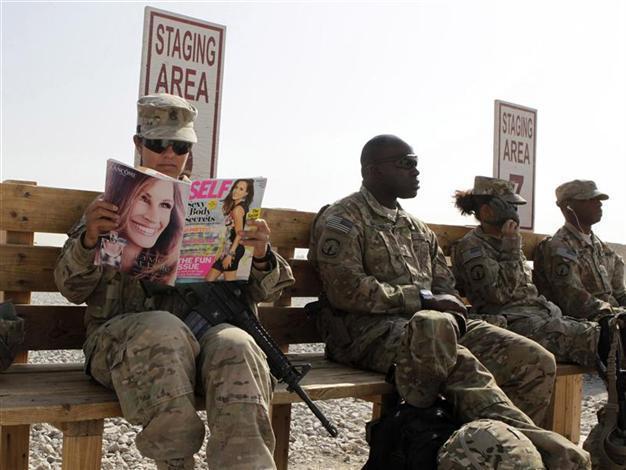US military opens door to women in ground combat
WASHINGTON

Women has been assigned into jobs as medics, military police and intelligence officers in the US Army. REUTERS photo
Ushering in a new era for the US military, Defense Secretary Leon Panetta on Thursday lifted a ban on women serving in ground combat, saying female troops had proven their courage in a decade of war.
The ground-breaking decision reflected the changed realities of the battlefield, Panetta said, as women soldiers already have been fighting in conflicts that lacked clear frontlines.
"Female service members have faced the reality of combat, proven their willingness to fight and, yes, to die to defend their fellow Americans," the Pentagon chief told a news conference.
"Not everyone is going to be able to be a combat soldier. But everyone is entitled to a chance," he said before signing a memo ending the ban.
President Barack Obama, whose inauguration address on Monday promoted the idea of opening opportunities to all Americans, hailed the move as "historic" and "another step toward fulfilling our nation's founding ideals of fairness and equality." The move highlighted evolving social attitudes and marked yet another sweeping change for the American military under Obama, who led a drive to end a prohibition on openly gay troops.
Panetta unveiled the decision after a months-long review by chiefs of all the armed services who unanimously endorsed a gradual change that would be phased in over the next three years.
Under the decision, the armed services will have until January 2016 to carry out the new policy. Military departments would have to submit detailed plans on implementing the order by May 15, 2013, Panetta said.
Panetta's decision will apply mainly to the Army and the Marine Corps, as the Air Force and Navy already have lifted most prohibitions on women in combat, allowing them to fly fighter jets and fire weapons on ships. In 2010, the Navy opted to allow women to serve on submarines.
US commanders began taking a second look at the ban in 2010 to reflect the changing conditions on the battlefield, as the wars in Iraq and Afghanistan have put women in harm's way.
General Martin Dempsey, chairman of the Joint Chiefs of Staff, told the same news conference that the move was part of a long-term trend in the military and that he had witnessed changes as an army division commander in Iraq.
Gender-neutral criteria for combat jobs would be drafted without watering down tough standards for physical strength or other skills, he said.
"The burden used to be that we would say, 'why should a woman serve in a particular specialty?' Now it's, 'why shouldn't a woman serve in a particular specialty?'" Dempsey said.
And the four-star general said he and other service chiefs expected women would make it into the elite ranks of the special operation forces: "I think we all believe that there will be women who can meet those standards." A senior defense official said the change would be incremental, to allow each service to ensure a smooth transition.
"With a change of this magnitude, it may take some time," the official, who spoke on condition of anonymity, told reporters.
14,5 percent in active duty
Women make up about 14.5 percent of the active duty U.S. military, or about 204,000 service members, according to the Pentagon. Advocates for changing the policy have long argued that denying female troops a chance at combat jobs effectively blocks them from attaining top jobs as commanders.
Women have represented around two percent of the U.S. casualties in Iraq and Afghanistan and some 12 percent, or 300,000, of those deployed in the war efforts in the past 11 years, in which there were often no clearly defined front lines, and where deadly guerrilla tactics have included roadside bombs that kill and maim indiscriminately. The decision also marks yet another sweeping change for the U.S. military under President Barack Obama, who led a drive to end a prohibition on openly gay troops.
Some jobs may open as soon as this year, while assessments for others, such as special operations forces, may take longer. There long has been opposition to putting women in combat, based on questions of whether they have the necessary strength and stamina for certain jobs, or whether their presence might hurt unit cohesion. But as news of Panetta’s expected order got out, rights groups as well as many members of Congress, including the Senate Armed Services Committee chairman, Democratic Senator Carl Levin, announced their support. “It reflects the reality of 21st century military operations,” he said.
However, objections were few. Jerry Boykin, executive vice president of the Family Research Council, called the move “another social experiment” that will place unnecessary burdens on military commanders. “While their focus must remain on winning the battles and protecting their troops, they will now have the distraction of having to provide some separation of the genders during fast-moving and deadly situations,” said Boykin, a retired Army lieutenant general. In addition to questions of strength and performance, there also have been suggestions that the American public would not tolerate large numbers of women being killed in war.
Compiled from AFP and AP stories by the Daily News staff.
